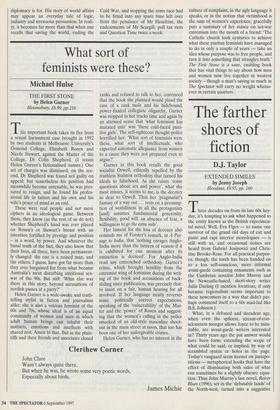What sort of feminists were these?
Michael Hulse
THE FIRST STONE by Helen Garner Bloomsbury, £6.99, pp.216 This important book takes its fire from a sexual harassment case brought in 1992 by two students at Melbourne University's Ormond College, Elizabeth Rosen and Nicole Stewart, against the Master of the College, Dr Colin Shepherd. (I retain Helen Gamer's fictionalised names.) One set of charges was dismissed; on the sec- ond, Dr Shepherd was found not guilty on appeal; but nonetheless his position had meanwhile become untenable, he was pres- sured to resign, and he found his profes- sional life in tatters and his own and his wife's peace of mind at an end.
These were real people and not mere ciphers in an ideological game. Between them, they know (as the rest of us do not) whether Shepherd's hand was ever placed on Rosen's or Stewart's breast with an intention fortified by prestige and position - in a word, by power. And whatever the banal truth of the fact, they also know that their lives, all three, have been permanent- ly changed: the one is a ruined man, and the others, I guess, have got far more than they ever bargained for from what became Australia's most disturbing attritional sex- war of the 90s. But still: 'What else was there in this story, beyond accusations of nerdish passes at a party?'
Helen Garner is a wide-awake and truth- telling stylist in fiction and journalism alike; she is also a veteran feminist of the 60s and 70s, whose ideal is of an equal community of women and men in which adult human beings can inhabit their instincts, emotions and intellects with shared zest. Amen to that. But as the plain- tiffs and their friends and associates closed ranks and refused to talk to her, convinced that the book she planned would plead the case of a rank male and his hidebound, power-fixated collegiate oligarchy, Garner was stopped in her tracks time and again by an alarmed sense that 'what feminism has mutated into' was 'these cold-faced puni- tive girls'. The self-righteous thought-police horrified her: 'What sort of feminists were these, what sort of intellectuals, who expected automatic allegiance from women to a cause they were not prepared even to argue?'
Garner in this book recalls the good socialist Orwell, ethically repelled by the truthless Stalinist orthodoxy that turned his ideals to falsehood. As she raises 'some questions about sex and power', what she most misses, it seems to me, is the decency so dear to Orwell. Thus her 'pragmatist's fantasy of a way out ... rests on a presump- tion of worldliness in all the protagonists [and] assumes fundamental generosity, flexibility, good will, an absence of fear, a willingness to go the extra mile'.
Her lament for the loss of decency also reminds me of Forster's remark, in A Pas- sage to India, that 'nothing enrages Anglo- India more than the lantern of reason if it is exhibited for one moment after its extinction is decreed'. For Anglo-India read any entrenched orthodoxy. Gamer's crime, which brought hostility from the extremist wing of feminism during the writ- ing of the book and accusations of back- sliding since publication, was precisely that: to insist on a fair, human hearing for all involved. If her language neatly reverses some politically correct expectations, speaking of the 'vulnerability' of the Mas- ter and the 'power' of Rosen and suggest- ing that the women's calling in the police smacked of an old-style masculine shoot- out in the main street at noon, that too has been one of her unforgivable crimes.
Helen Garner, who has no interest in the culture of complaint, in the ugly language it speaks, or in the notion that victimhood is the sum of women's experience, gracefully puts a summary of her stance on sex-war extremism into the mouth of a friend: 'The Catholic church took centuries to achieve what these puritan feminists have managed to do in only a couple of years — take an idea whose purpose was to free people, and turn it into something that strangles truth.' The First Stone is a sane, enabling book that has vital things to say about how men and women now live together in western society - though a man's saying as much in The Spectator will carry no weight whatso- ever in certain quarters.


























































 Previous page
Previous page